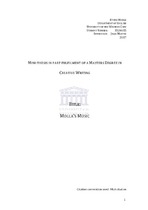| dc.description.abstract | Molla's Music is a novella about Maureen (Molla), a white Afrikaans woman born in 1935 in Cape Town, who faced poverty and abandonment before apartheid and who, during apartheid, faced the choice between an unwanted pregnancy with a married man, and a carreer in music funded by the father who had betrayed her. Maureen is introduced in three sections with very different voices in each. In the first section she is depicted in the context of being cared for by a single mother with severe post natal depression. The short chapters and long sentences reflect the naïvity of the subject, whose unfiltered observations allow the reader to bear witness to the traumas that dictate her character later in life. She was so ashamed of her poverty, her father's abandonment, and her pregnancy, that she hid all memories of her past from her children and grandchildren and almost managed to die with all her secrets in tact. The second section becomes more sophisticated with longer chapters. The reader is guided through the fifties by a young adult whose adolescent memories inform the events that unfold over a mere two days. Finally, the last section consists of only one chapter, but it reviews an entire life. It is written in the first person, revealing the identity of the narrator. Maureen taught herself piano before school. Her father played the violin and her dedication to music seems to be a mechanism for connecting to him and what his absence from her life represents. It is an absense that eludes consolidation until her death. Molla proved to be such a gifted child that she skipped two years of school and took on music as an extra subject until matric, but financial strain and the shackles of patriarchy limited her options and only after years of working, does she apply to the UCT college of music. She inherits a piano from her landlords, who are evicted during the implementation of the Group Areas Act of 1957. In the years after that, playing piano becomes her private liberation practised in plain sight, on the only heirloom that persists from her past. When she dies, her granddaughter has a heritage that beckons to be resolved and remembered. She does not play the piano she inherited from her grandmother, but starts to investigate its past. In the course of Molla's Music, I explore themes of Afrikaner identity, and question modes of being for white Afrikaans women in South Africa today. By offering an intimate depiction of an individual's search for meaning, while negotiating the forces of Apartheid and patriarchy, especially as a confluence of forces, I hope to gain clarity with regard to my own questions about identity. | en_US |

